It’s news to no one that eating fruit is good for your health. That said, if you’re concerned with your sugar intake—be it because of diabetes or some other reason—not all fruits are created equal. For this reason, we spoke to a registered dietician to get some of the top picks for low-sugar fruits that won’t spike your blood glucose levels.
Before you start snacking on mother nature’s candy, though, the expert says there are a couple other things to keep in mind—namely that when it comes to blood sugar levels, it’s always best to opt for the whole fruit instead of just drinking its juice , and that even low-sugar fruits can impact glucose levels when consumed as “naked carbs” (ie, all by their lonesome), which is why you’d be wise to pair fruit with a protein or healthy fat whenever possible.
Meet the Experts
Alyssa Wilson is a registered dietician whose experience includes serving as a nutrition coach at a major gym, leading nutrition programs in corporate wellness and, currently, working as a Metabolic Success Coach with Signos.
How Much Sugar Should You Aim for in a Day?
When it comes to selecting low-sugar foods, a little context in the form of recommended daily intake (RDI) can be very helpful. So how much sugar are you actually supposed to be consuming anyway? Well, friends, the answer is a bit more complicated than you think—namely because the only hard and fast recommendations you’ll find relate to added sugars, which are far worse for your health than the nutritionally beneficial, natural sugars found in whole, raw fruits.
According to the 2015-2020 Dietary Guidelines for Americans, no more than 10 percent of your daily caloric intake should come from added sugars (so, 200 calories or 50 grams of sugar per day on a 2,000 calorie per day diet). the American Heart Association has more conservative guidelines—recommending an upper limit of 100 calories or 24 grams of added sugar per day for most women.
As previously mentioned, the natural sugars found in fruit are a very different story, and there are no upper limits on their consumption—namely because they are often a good source of dietary fiber and nutrients, and are processed by the body very differently than added sugars. . As such, aim to eat natural sugars in place of added sugars whenever you can and know that you needn’t worry about eating fruit because, though it is technically possible to get too much of a good thing, the experts at WebMD say you’ d have to try really hard to achieve a problematic level of sugar consumption from fruit alone.
The takeaways? Steer clear of added sugar, but don’t sweat the natural stuff found in fruits and vegetables. And if you have diabetes, remember that the most important thing is to monitor your blood glucose levels according to your doctor’s instructions, because those can be influenced by a variety of foods (including fruit) and they’re a very big deal for your health .
7 Low-Sugar Cocktails That Are Happy Hour Ready (but Not Syrupy Sweet)

Kseniya Sharapova/Getty Images
1. Strawberries
Amount of Sugar: 7 grams per cup
In addition to being an excellent low-sugar option, strawberries can raise good cholesterol and reduce blood pressure, and just one cup of the whole fruit provides your recommended daily dose of Vitamin C.

Mykhailo Lukashuk/Getty Images
2. Raspberries
Amount of Sugar: 5.4 grams per cup
Wilson tells us that berries are one of the best low-sugar fruits you can eat in general, but if we’re talking about specific types of berries, raspberries have the lowest sugar with a mere 5 grams per cup.
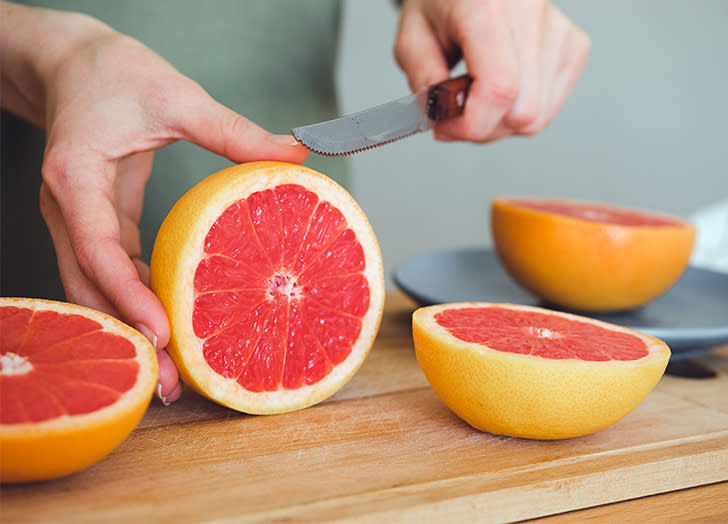
Aleksandr Zubkov/Getty Images
2. Grapefruits
Amount of Sugar: 10.6 grams per half fruit
Grapefruits are known for being tart, so it should come as no surprise that one half of this (quite large) fruit has only roughly 11 grams of sugar. Best of all, grapefruit can help keep insulin levels even, thereby reducing the risk of type 2 diabetes.

Joko Susilo / EyeEm/Getty Images
3. Kiwis
Amount of Sugar: 6.7 grams per kiwi
Technically considered a berry, one kiwi—which is easy to find all year—has just about 7 grams of sugar. This fruit is also an excellent source of Vitamin E, which helps protect the skin from sun damage.
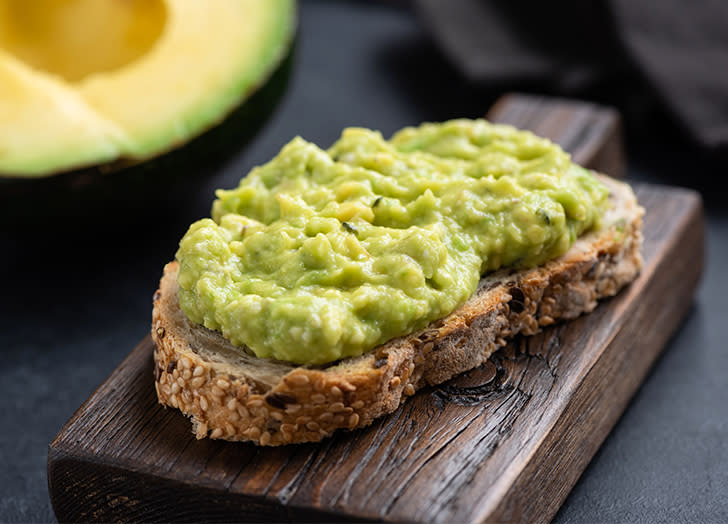
Arx0nt/Getty Images
4. Avocados
Amount of Sugar: 1 gram per avocado
Avocados are as close to sugar-free as a fruit can be (and yes, they are technically fruits). An entire avocado has only 1 gram of sugar, along with the added benefit of being packed with healthy fats.
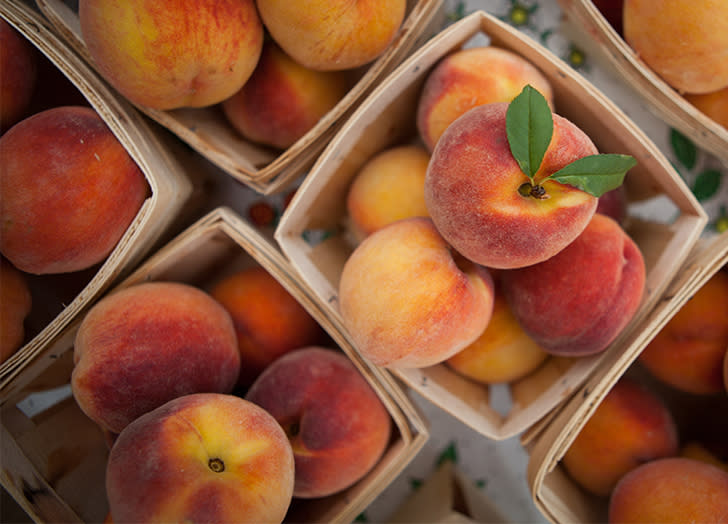
Rudy Malmquist/Getty Images
6. Peaches
Amount of Sugar: 12.6 grams per fruit
While a perfectly ripe peach does indeed taste quite sweet, the average peach only has about 13 grams of sugar. Peaches are also full of Vitamins C, B2 and A, as well as iron and antioxidants.

Olena Gorbenko delicious food/Getty Images
7. Plums
Amount of Sugar: 6.6 grams per fruit
With only 30 calories and roughly 7 grams of sugar, plums are the perfect low-sugar fruit to add to salads and desserts for a little sweetness. Plums are also rich in fiber, which helps slow down a blood sugar spike after you eat carbs.
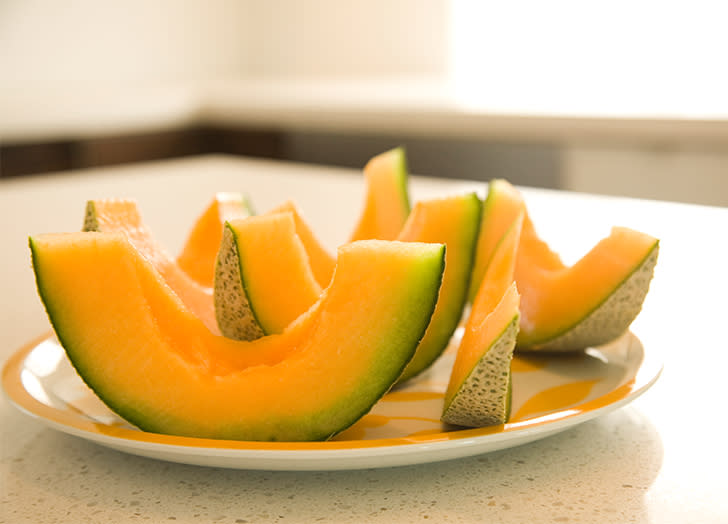
RCWW, Inc./Getty images
8. Cantaloupe
Amount of Sugar: 12.6 grams per cup
Clocking in at just under 13 grams per cup of cubed fruit, cantaloupe is relatively low in sugar and fairly low in carbs, since it is 90 percent water. Cantaloupe is also a great source of Vitamin A.
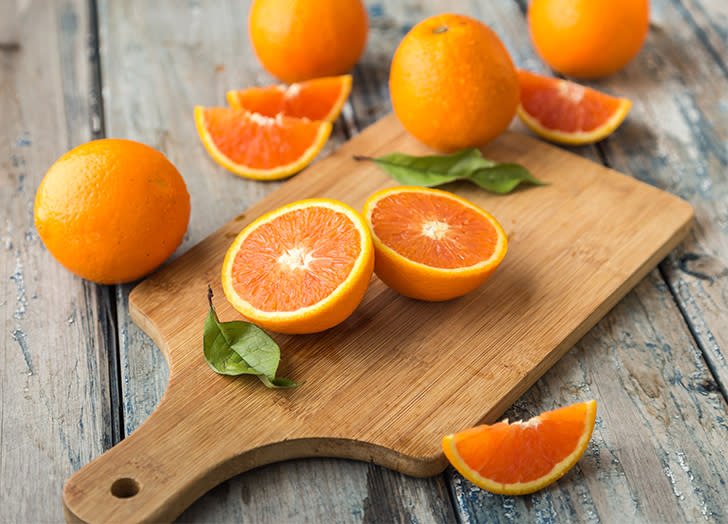
edit: ansonmiao/Getty Images
9. Oranges
Amount of Sugar: 13.8 grams per fruit
Known for being high in Vitamin C, a navel orange has around 70 calories and less than 14 grams of sugar. Oranges help your body absorb iron, while also boosting your immune system.
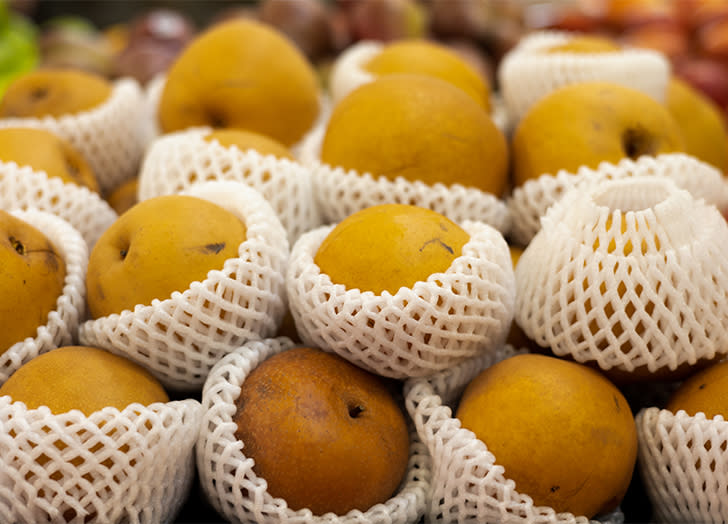
Catherine McQueen/Getty Images
10. Asian Pears
Amount of Sugar: 8.6 grams per fruit
Pears are a tasty fruit composed of mostly water and relatively little sugar. Asian pears are a particularly good choice, since they contain only about 9 grams of sugar, which is less than a regular pear, and boasts a satisfying crunch of an apple.
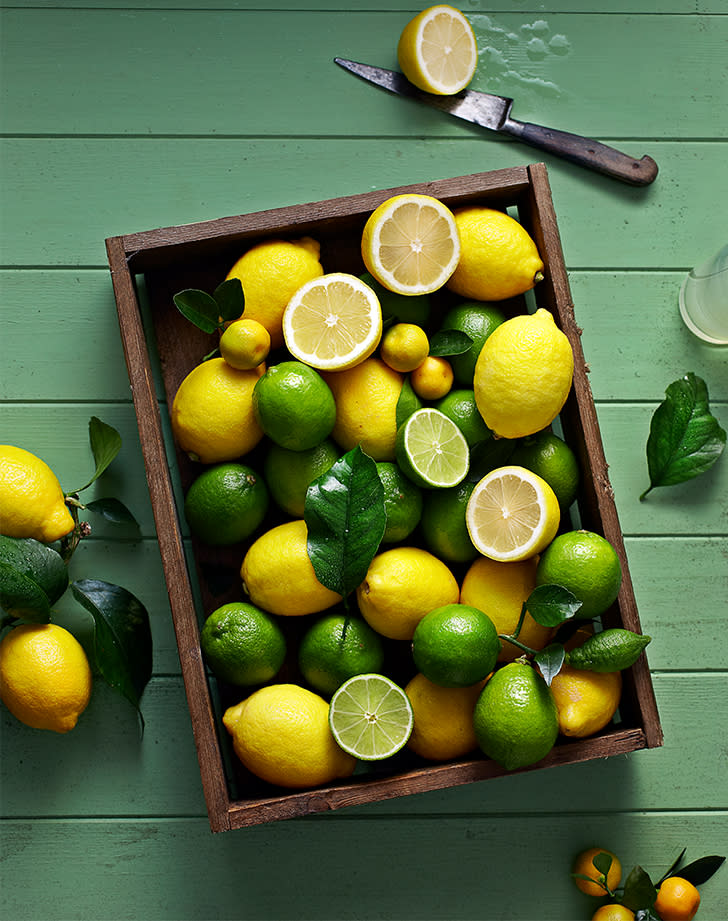
Martin Poole/Getty Images
11. Lemons and Lime
Amount of Sugar: 2.1 grams per lemon; 1.1 grams per lime
With only about 2 grams and 1 gram of sugar, respectively, lemons and limes are perfect for adding to a glass of water. Plus, both of these citrus fruits are loaded with Vitamin C, which can reduce your risk of stroke and heart disease.

Alberto Rojas Garcia/Getty Images
12. Cucumbers
Amount of Sugar: 5 grams per fruit
Here, another undercover fruit with an impressively small amount of sugar (a scant 5 grams per cuke). Cucumbers also contain magnesium, potassium and Vitamin K, which all play an important role in the cardiovascular system.
18 Low-Sugar Desserts That Won’t Destroy Your Diet
